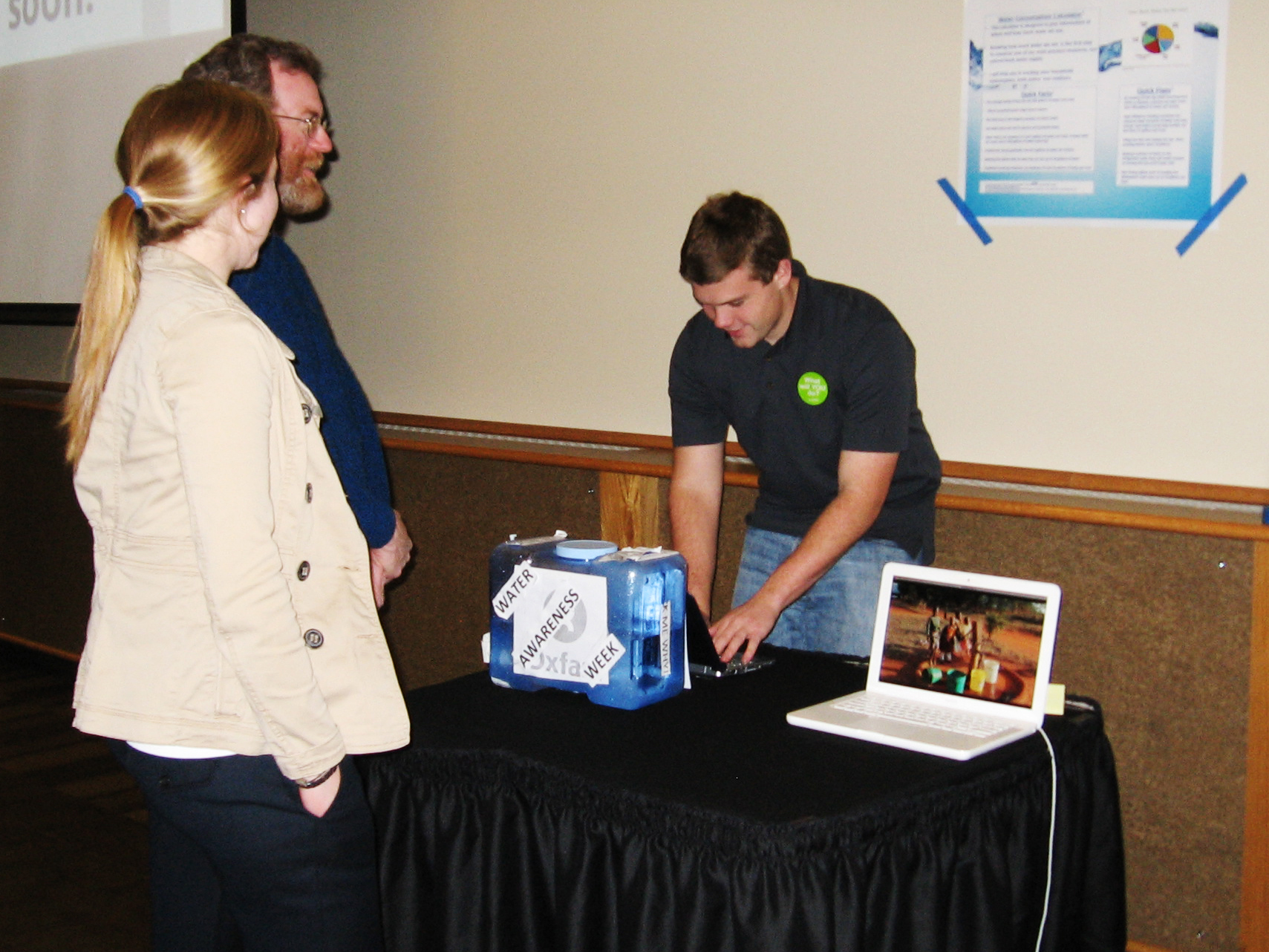
Junior Kyle Freischlag (right) gave the closing remarks at the Oxfam Hunger Banquet, encouraging attendees to think about how much food they waste.
On March 21, more than 100 Central College students, faculty and staff sat down to a banquet in the Graham Conference Center. These types of events are fairly common on campus, but this time there was a catch. Only 15 percent of the attendees got the three-course meal normally served at such affairs. The rest ate rice.
The members of Ellen Du Pre’s Epidemiology course planned the Oxfam Hunger Banquet to raise awareness about food disparity around the globe. The attendees were randomly divided into three groups: upper, middle and lower class. The first group—only 15 percent of the total—received salad, chicken, alfredo pasta, a breadstick and cake. Those placed in the middle class group dined on ½ cup of rice with beans. The lower class, which consisted of 50 percent of the attendees, was served just ½ cup of rice.
The meals were meant to imitate the normal portions of different classes of people around the globe. Rachel Frana, a sophomore environmental studies major in the Epidemiology course, was surprised by the meagerness of the middle- and lower-class meals. What most middle-class Americans would consider a good meal was actually the upper-class portion, she says. The middle-class group subsisted on fare that most Americans would consider the diet of the poor.
The Oxfam Hunger Banquet opened a lot of eyes, which was the goal of the class. With the help of the Center for Community-Based Learning, they organized and marketed the banquet, even encouraging the Pella Rotary Club to fund the meals of several high school students.
Epidemiology is the study of the patterns, causes and effects of health conditions. Frana, a global health minor, went into the course without any idea what the term meant; she only knew it was a requirement for the minor. But she quickly grew passionate about the issues they were covering—Global Information Systems (GIS), disease outbreaks, pollution, access to clean water, global inequalities. “What we are learning about is actually very applicable to real life,” Frana says. “We learn about how our health is affected by things you don’t think about on a daily basis.”
The hunger banquet was an attempt to take their new awareness to the larger campus. The students were especially hopeful that the Central community would realize how wasteful Americans can be, especially compared to the lack of food and water in other parts of the world. “You don’t realize how much you have until you don’t have it,” says Kyle Freischlag, a junior biology and history major who plans to go on to medical school.

The Epidemiology course also held a Water Awareness Week where they used just 3 gallons of water a day
During the banquet, Frana was especially attentive to the reactions of people who didn’t get their normal meal. She noticed envy and resentment toward those at the upper-class tables. “I realized if we were in that same building for any other event on campus, we would be eating the exact same meal,” Frana says. “We would have the salad and the dessert, and we wouldn’t feel guilty about it.”
Frana has noticed that lack of shame all over campus—as students throw away half-eaten meals without a second thought. “If they had an entire nation full of hungry people sitting right next to them watching them be so wasteful, I think they would feel differently,” she says.
That was the purpose of the event—to bring those hungry people near those stuffing themselves. The result was increased awareness of food disparity on both sides. Frana hopes the event will lead to some lifestyle changes among the attendees. Several people signed up for a newsletter with more information afterwards.
Freischlag, who gave the closing remarks at the banquet, is optimistic that his class made a difference. He says that thinking about food disparity leads to conversations on the subject, which in turns leads to action.
“If takes a million little changes to change the world,” he says. “Perhaps we caused several of those small changes in the lives of others.”



